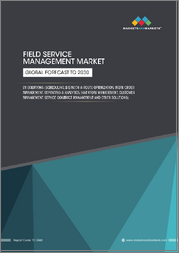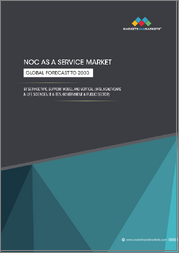
|
시장보고서
상품코드
1489342
필드 서비스 관리 시장 예측(-2030년) : 컴포넌트별, 도입별, 기업별, 최종사용자별, 지역별 세계 분석Field Service Management Market Forecasts to 2030 - Global Analysis By Component (Solution and Services), Deployment, Enterprise, End User and By Geography |
||||||
Stratistics MRC에 따르면 세계의 필드 서비스 관리 시장은 2023년에 40억 달러를 차지하며, 예측 기간 중 CAGR은 14.8%로, 2030년에는 105억 달러에 달할 것으로 예측되고 있습니다.
필드 서비스 관리(FSM)는 고객의 현장에서 서비스를 제공하는 데 필요한 차량, 툴, 인력 등의 자원을 관리하는 것을 말합니다. 이 관리에는 일반적으로 작업 예약 및 발송, 작업 지시 추적, 재고 관리, 고객 응대, 전반적인 운영 효율성 최적화 등이 포함됩니다. 이러한 시스템에는 종종 모바일 앱, GPS 추적, 분석과 같은 소프트웨어 및 기술이 내장되어 있으며, 현장 작업을 효율화하고 고객 만족도를 향상시키는 데 도움이 됩니다.
Yotta의 조사에 따르면 인도 기업의 37%가 디지털 인프라를 클라우드로 활용하고 있으며, 2022년까지 60% 이상이 클라우드를 도입할 것으로 예상하고 있습니다.
모바일 솔루션 도입 증가
이 시장에서는 모바일 솔루션 도입이 눈에 띄게 증가하고 있습니다. 기업은 모바일 기술을 활용하여 업무를 간소화하고, 커뮤니케이션을 강화하며, 현장 서비스 업무의 전반적인 효율성을 개선하기 위해 모바일 기술을 활용하고 있습니다. 모바일 솔루션은 데이터에 대한 실시간 액세스를 제공하여 현장 기술자가 보다 신속한 서비스를 제공하고 문제를 신속하게 해결하며 고객 만족을 보장할 수 있도록 지원합니다. 이러한 추세는 모바일 플랫폼이 필드 서비스 관리 프로세스를 최적화하는 데 필수적인 툴로 인식되고 있음을 강조합니다.
통합의 부재
현재 시장은 다양한 솔루션 간의 통합이 현저하게 부족합니다. 이러한 단편화는 서로 다른 툴 간의 원활한 통신을 방해하고 비효율성과 데이터 사일로를 초래하고 있습니다. 표준화된 통합 프로토콜의 부재는 이 문제를 더욱 복잡하게 만들고, 기업이 전체적인 FSM 솔루션을 채택하는 데 어려움을 겪고 있습니다. 그 결과, 기업은 현장 서비스 업무에서 최적의 생산성, 고객 만족도, 업무 투명성을 달성하는 데 어려움을 겪고 있습니다.
자동화 및 디지털화 도입 증가
기업은 AI, IoT, 클라우드 기반 플랫폼과 같은 첨단 기술을 활용하여 업무를 간소화하고, 효율성을 높이고, 우수한 고객 경험을 제공하기 위해 점점 더 많은 노력을 기울이고 있습니다. 이러한 추세의 배경에는 실시간 데이터, 예지보전 기능, 원격 모니터링에 대한 요구가 있으며, 이 모든 것이 현장 서비스 전반의 의사결정을 개선하고 비용을 절감하는 데 기여하고 있습니다. 이러한 이유로 시장에서는 자동화 및 디지털화 도입이 급증하고 있습니다.
도입 비용
필드 서비스 관리 솔루션을 도입하는 데는 일반적으로 여러 분야에서 비용이 발생합니다. 소프트웨어 라이선스 비용, 커스터마이징 및 통합 비용, 직원 교육 및 배치 비용, 모바일 기기 및 연결을 위한 하드웨어 및 인프라 투자, 지속적인 유지보수 및 지원 비용, 데이터 보안 및 컴플라이언스 조치와 관련된 잠재적 비용 등이 포함됩니다. 포함됩니다. 따라서 이러한 요소들이 시장 성장을 저해하는 요인으로 작용하고 있습니다.
COVID-19의 영향 :
COVID-19는 필드 서비스 관리(FSM) 시장에 큰 영향을 미쳐 원격 근무와 디지털 솔루션으로의 빠른 전환을 촉진했습니다. 기업은 안전 프로토콜을 우선시하여 가상 문제 해결 및 유지보수를 위한 FSM 소프트웨어의 채택이 증가했으며, IoT 지원 장비에 대한 수요가 급증하고 실시간 모니터링 기능이 강화되었습니다. 또한 팬데믹은 예지보전, 인력 최적화, 비접촉식 서비스 제공 등의 추세를 가속화하여 FSM 시장을 보다 민첩하고 기술 중심의 솔루션으로 변화시켰습니다.
예측 기간 중 솔루션 부문이 가장 큰 비중을 차지할 것으로 예상됩니다.
솔루션 부문은 예측 기간 중 가장 큰 성장세를 보일 것으로 예상됩니다. 이는 실시간 스케줄링, 경로 최적화, 재고 관리, 모바일 인력 지원 등의 기능을 제공하는 강력한 소프트웨어를 통해 실현되며, IoT, AI 및 분석을 통합함으로써 FSM 솔루션은 기업이 현장 운영을 간소화하고, 비용을 절감하며, 다운타임을 최소화하고, 우수한 서비스를 제공하고, 궁극적으로 수익성과 고객 만족도를 높일 수 있도록 지원한다, 다운타임을 최소화하고, 우수한 서비스를 제공함으로써 수익성과 고객 만족도를 높일 수 있습니다.
예측 기간 중 통신 분야가 가장 높은 CAGR을 보일 것으로 예상됩니다.
예측 기간 중 가장 높은 CAGR을 보일 것으로 예상되는 분야는 통신 분야입니다. IoT, 클라우드 컴퓨팅, 모바일 앱과 같은 첨단 기술을 통해 통신 사업자는 현장 기술자와 중앙 업무 간의 실시간 커뮤니케이션을 가능하게 하여 효율성과 생산성을 향상시키고, 현장 작업을 간소화하고, 자원 배분을 최적화하고, 고객 서비스를 개선할 수 있습니다. 향상시킬 수 있습니다. 통신 서비스와 이러한 솔루션의 통합은 혁신을 촉진하고 적시에 효과적인 현장 서비스를 제공하는 비즈니스를 지원합니다.
가장 큰 점유율을 차지하는 지역
예측 기간 중 북미가 가장 큰 시장 점유율을 차지할 것으로 예상됩니다. 효율성과 고객 만족을 중시하는 FSM 솔루션은 제조, 헬스케어, 유틸리티 등 다양한 산업에서 높은 수요를 보이고 있습니다. 이 지역의 주요 기업은 실시간 추적, 스케줄링 최적화, 모바일 인력 관리와 같은 고급 기능을 통합한 종합적인 FSM 플랫폼을 제공합니다. 북미 FSM 시장은 기업이 업무 간소화와 서비스 제공을 강화하는 것을 우선순위로 삼으면서 지속적으로 성장하고 있습니다.
CAGR이 가장 높은 지역 :
예측 기간 중 아시아태평양이 가장 높은 CAGR을 나타낼 것으로 예상됩니다. 클라우드 컴퓨팅, 사물인터넷(IoT), 인공지능(AI), 모바일 기기 등 첨단 기술의 도입으로 상황이 바뀌었습니다. 이러한 기술은 실시간 통신, 원격 모니터링, 예지보전, 데이터 분석을 가능하게 하여 업무 효율성과 고객 만족도를 향상시킬 수 있습니다. 정비, 수리 및 애프터 서비스를 포함한 이 지역의 서비스 부문은 다양한 산업 분야에서 빠르게 성장하고 있습니다.
무료 커스터마이징 제공:
이 보고서를 구독하는 고객은 다음과 같은 무료 맞춤화 옵션 중 하나를 사용할 수 있습니다. :
- 기업 개요
- 추가 시장 기업의 종합적인 프로파일링(최대 3사)
- 주요 기업의 SWOT 분석(최대 3사)
- 지역 세분화
- 고객의 관심에 따른 주요 국가별 시장 추정치, 예측, CAGR(주: 타당성 확인에 따름)
- 경쟁사 벤치마킹
- 제품 포트폴리오, 지역적 입지, 전략적 제휴를 기반으로 한 주요 기업 벤치마킹
목차
제1장 주요 요약
제2장 서문
- 개요
- 이해관계자
- 조사 범위
- 조사 방법
- 데이터 마이닝
- 데이터 분석
- 데이터 검증
- 조사 어프로치
- 조사 정보원
- 1차 조사 정보원
- 2차 조사 정보원
- 전제조건
제3장 시장 동향 분석
- 촉진요인
- 억제요인
- 기회
- 위협
- 최종사용자 분석
- 신흥 시장
- COVID-19의 영향
제4장 Porter's Five Forces 분석
- 공급 기업의 교섭력
- 구매자의 교섭력
- 대체품의 위협
- 신규 진출업체의 위협
- 경쟁 기업간 경쟁 관계
제5장 세계의 필드 서비스 관리 시장 : 컴포넌트별
- 해결
- 보증 관리
- 인재 관리
- 재고 관리
- 모바일 필드 시행
- 고객 관리
- 서비스 계약 관리
- 서비스
- 실장
- 트레이닝과 지원
- 컨설팅과 어드바이저리
제6장 세계의 필드 서비스 관리 시장 : 도입별
- 클라우드
- 온프레미스
제7장 세계의 필드 서비스 관리 시장 : 기업별
- 중소기업
- 대기업
제8장 세계의 필드 서비스 관리 시장 : 최종사용자별
- 제조업
- 헬스케어
- 통신
- 에너지·유틸리티
- 운송·물류
- 건설·부동산
- 기타 최종사용자
제9장 세계의 필드 서비스 관리 시장 : 지역별
- 북미
- 미국
- 캐나다
- 멕시코
- 유럽
- 독일
- 영국
- 이탈리아
- 프랑스
- 스페인
- 기타 유럽
- 아시아태평양
- 일본
- 중국
- 인도
- 호주
- 뉴질랜드
- 한국
- 기타 아시아태평양
- 남미
- 아르헨티나
- 브라질
- 칠레
- 기타 남미
- 중동 및 아프리카
- 사우디아라비아
- 아랍에미리트
- 카타르
- 남아프리카공화국
- 기타 중동 및 아프리카
제10장 주요 발전
- 계약, 파트너십, 협업, 합병사업
- 인수합병
- 신제품 발매
- 사업 확대
- 기타 주요 전략
제11장 기업 프로파일링
- Microsoft
- Oracle
- ServiceMax
- IBM Corporation
- Agile 3 Solutions LLC
- ServiceNow
- Klugo Group, SAP SE
- Infor
- ServicePower
- Accenture
- Comarch SA
- Salesforce, Inc.
- Astea International, Inc.
- Trimble Navigation Limited
- Tech Mahindra Limited
According to Stratistics MRC, the Global Field Service Management Market is accounted for $4.0 billion in 2023 and is expected to reach $10.5 billion by 2030 growing at a CAGR of 14.8% during the forecast period. Field Service Management (FSM) refers to the practice of managing a company's resources, such as vehicles, tools, and personnel that are involved in providing services to customers at their locations. This management typically includes scheduling and dispatching tasks, tracking work orders, managing inventory, handling customer interactions, and optimizing overall operational efficiency. These systems often incorporate software and technologies like mobile apps, GPS tracking, and analytics to streamline field operations and improve customer satisfaction.
According to a Yotta survey, 37% of Indian enterprises had their digital infrastructure in the cloud, with more than 60% expected to be adopted through the cloud by 2022.
Market Dynamics:
Driver:
Rising adoption of mobile solutions
The market is witnessing a notable uptick in mobile solution adoption. Companies are increasingly leveraging mobile technologies to streamline operations, enhance communication, and improve overall efficiency in field service tasks. Mobile solutions offer real-time access to data, enabling field technicians to deliver faster service, resolve issues promptly, and ensure customer satisfaction. This trend underscores the growing recognition of mobile platforms as indispensable tools for optimizing field service management processes.
Restraint:
Lack of integration
The market is currently grappling with a significant lack of integration across various solutions. This fragmentation hinders seamless communication between different tools, leading to inefficiencies and data silos. The absence of standardized integration protocols further compounds this issue, making it challenging for organizations to adopt holistic FSM solutions. As a result, businesses face hurdles in achieving optimal productivity, customer satisfaction, and operational transparency within their field service operations.
Opportunity:
Increased adoption of automation and digitalization
Companies are increasingly leveraging advanced technologies like AI, IoT, and cloud-based platforms to streamline operations, enhance efficiency, and deliver superior customer experiences. This trend is driven by the need for real-time data, predictive maintenance capabilities, and remote monitoring, all of which contribute to improved decision-making and cost savings across the field service landscape. Thus, the market is experiencing a surge in automation and digitalization adoption.
Threat:
Cost of implementation
Implementing field service management solutions typically incurs costs across several areas. These include software licensing fees, customization and integration expenses, and training and on boarding costs for employees, hardware and infrastructure investments for mobile devices and connectivity, ongoing maintenance and support fees, and potential costs associated with data security and compliance measures. Hence, these are the factors hampering the growth of the market.
Covid-19 Impact:
The COVID-19 pandemic significantly impacted the Field Service Management (FSM) market, driving a rapid shift towards remote work and digital solutions. Companies prioritized safety protocols, leading to increased adoption of FSM software for virtual troubleshooting and maintenance. The demand for IoT-enabled devices also surged, enhancing real-time monitoring capabilities. Additionally, the pandemic accelerated trends like predictive maintenance, workforce optimization, and contactless service delivery, shaping the FSM market towards more agile and tech-driven solutions.
The solution segment is expected to be the largest during the forecast period
The solution segment is expected to be the largest during the forecast period. This is achieved through robust software that offers features like real-time scheduling, route optimization, inventory management, and mobile workforce support. By integrating IoT, AI, and analytics, FSM solutions empower businesses to streamline field operations, reduce costs, minimize downtime, and deliver superior service, ultimately driving profitability and customer satisfaction.
The telecom segment is expected to have the highest CAGR during the forecast period
The telecom segment is expected to have the highest CAGR during the forecast period. Their services enable real-time communication between field technicians and central operations, enhancing efficiency and productivity. Through advanced technologies like IoT, cloud computing, and mobile apps, telecoms streamline field operations, optimize resource allocation, and improve customer service. This integration of telecom services with these solutions drives innovation and supports businesses in delivering timely and effective field services.
Region with largest share:
North America is projected to hold the largest market share during the forecast period. With a strong focus on efficiency and customer satisfaction, FSM solutions are in high demand across various industries such as manufacturing, healthcare, and utilities. Key players in the region offer comprehensive FSM platforms that integrate advanced features like real-time tracking, scheduling optimization, and mobile workforce management. The North American FSM market continues to expand as businesses prioritize streamlined operations and enhanced service delivery.
Region with highest CAGR:
Asia Pacific is projected to hold the highest CAGR over the forecast period. The adoption of advanced technologies such as cloud computing, Internet of Things (IoT), artificial intelligence (AI), and mobile devices has transformed the landscape. These technologies enable real-time communication, remote monitoring, predictive maintenance, and data analytics, enhancing operational efficiency and customer satisfaction. The service sector in the region, including maintenance, repair, and after-sales services, has expanded rapidly across various verticals.
Key players in the market
Some of the key players in Field Service Management market include Microsoft, Oracle, ServiceMax, IBM Corporation, Agile 3 Solutions LLC, ServiceNow, Klugo Group, SAP SE, Infor, ServicePower , Accenture, Comarch SA, Salesforce, Inc., Astea International, Inc., Trimble Navigation Limited and Tech Mahindra Limited.
Key Developments:
In January 2024, ServicePower partnered with Encompass Simply Parts, an OEM supplier, to offer simplified and streamlined capabilities for parts ordering to all service providers utilizing the ServicePower platform and ServicePower HUB.
In June 2023, Microsoft announced that the release of field service software would enhance field service operations for service managers. Dispatchers can streamline the triage and assignment of work orders by prioritizing those in proximity. The updated schedule board experience is accessible to all users, and improvements for frontline workers for their mobile applications.
Components Covered:
- Solution
- Services
Deployments Covered:
- Cloud
- On-Premise
Enterprises Covered:
- Small and Medium-sized Enterprises (SMEs)
- Large Enterprises
End Users Covered:
- Manufacturing
- Healthcare
- Telecom
- Energy & Utilities
- Transportation and Logistics
- Construction and Real Estate
- Other End Users
Regions Covered:
- North America
- US
- Canada
- Mexico
- Europe
- Germany
- UK
- Italy
- France
- Spain
- Rest of Europe
- Asia Pacific
- Japan
- China
- India
- Australia
- New Zealand
- South Korea
- Rest of Asia Pacific
- South America
- Argentina
- Brazil
- Chile
- Rest of South America
- Middle East & Africa
- Saudi Arabia
- UAE
- Qatar
- South Africa
- Rest of Middle East & Africa
What our report offers:
- Market share assessments for the regional and country-level segments
- Strategic recommendations for the new entrants
- Covers Market data for the years 2021, 2022, 2023, 2026, and 2030
- Market Trends (Drivers, Constraints, Opportunities, Threats, Challenges, Investment Opportunities, and recommendations)
- Strategic recommendations in key business segments based on the market estimations
- Competitive landscaping mapping the key common trends
- Company profiling with detailed strategies, financials, and recent developments
- Supply chain trends mapping the latest technological advancements
Free Customization Offerings:
All the customers of this report will be entitled to receive one of the following free customization options:
- Company Profiling
- Comprehensive profiling of additional market players (up to 3)
- SWOT Analysis of key players (up to 3)
- Regional Segmentation
- Market estimations, Forecasts and CAGR of any prominent country as per the client's interest (Note: Depends on feasibility check)
- Competitive Benchmarking
- Benchmarking of key players based on product portfolio, geographical presence, and strategic alliances
Table of Contents
1 Executive Summary
2 Preface
- 2.1 Abstract
- 2.2 Stake Holders
- 2.3 Research Scope
- 2.4 Research Methodology
- 2.4.1 Data Mining
- 2.4.2 Data Analysis
- 2.4.3 Data Validation
- 2.4.4 Research Approach
- 2.5 Research Sources
- 2.5.1 Primary Research Sources
- 2.5.2 Secondary Research Sources
- 2.5.3 Assumptions
3 Market Trend Analysis
- 3.1 Introduction
- 3.2 Drivers
- 3.3 Restraints
- 3.4 Opportunities
- 3.5 Threats
- 3.6 End User Analysis
- 3.7 Emerging Markets
- 3.8 Impact of Covid-19
4 Porters Five Force Analysis
- 4.1 Bargaining power of suppliers
- 4.2 Bargaining power of buyers
- 4.3 Threat of substitutes
- 4.4 Threat of new entrants
- 4.5 Competitive rivalry
5 Global Field Service Management Market, By Component
- 5.1 Introduction
- 5.2 Solution
- 5.2.1 Warranty Management
- 5.2.2 Workforce Management
- 5.2.3 Inventory Management
- 5.2.4 Mobile field execution
- 5.2.5 Customer management
- 5.2.6 Service contract management
- 5.3 Services
- 5.3.1 Implementation
- 5.3.2 Training & Support
- 5.3.3 Consulting & Advisory
6 Global Field Service Management Market, By Deployment
- 6.1 Introduction
- 6.2 Cloud
- 6.3 On-Premise
7 Global Field Service Management Market, By Enterprise
- 7.1 Introduction
- 7.2 Small and Medium-sized Enterprises (SMEs)
- 7.3 Large Enterprises
8 Global Field Service Management Market, By End User
- 8.1 Introduction
- 8.2 Manufacturing
- 8.3 Healthcare
- 8.4 Telecom
- 8.5 Energy & Utilities
- 8.6 Transportation and Logistics
- 8.7 Construction and Real Estate
- 8.8 Other End Users
9 Global Field Service Management Market, By Geography
- 9.1 Introduction
- 9.2 North America
- 9.2.1 US
- 9.2.2 Canada
- 9.2.3 Mexico
- 9.3 Europe
- 9.3.1 Germany
- 9.3.2 UK
- 9.3.3 Italy
- 9.3.4 France
- 9.3.5 Spain
- 9.3.6 Rest of Europe
- 9.4 Asia Pacific
- 9.4.1 Japan
- 9.4.2 China
- 9.4.3 India
- 9.4.4 Australia
- 9.4.5 New Zealand
- 9.4.6 South Korea
- 9.4.7 Rest of Asia Pacific
- 9.5 South America
- 9.5.1 Argentina
- 9.5.2 Brazil
- 9.5.3 Chile
- 9.5.4 Rest of South America
- 9.6 Middle East & Africa
- 9.6.1 Saudi Arabia
- 9.6.2 UAE
- 9.6.3 Qatar
- 9.6.4 South Africa
- 9.6.5 Rest of Middle East & Africa
10 Key Developments
- 10.1 Agreements, Partnerships, Collaborations and Joint Ventures
- 10.2 Acquisitions & Mergers
- 10.3 New Product Launch
- 10.4 Expansions
- 10.5 Other Key Strategies
11 Company Profiling
- 11.1 Microsoft
- 11.2 Oracle
- 11.3 ServiceMax
- 11.4 IBM Corporation
- 11.5 Agile 3 Solutions LLC
- 11.6 ServiceNow
- 11.7 Klugo Group, SAP SE
- 11.8 Infor
- 11.9 ServicePower
- 11.10 Accenture
- 11.11 Comarch SA
- 11.12 Salesforce, Inc.
- 11.13 Astea International, Inc.
- 11.14 Trimble Navigation Limited
- 11.15 Tech Mahindra Limited



















